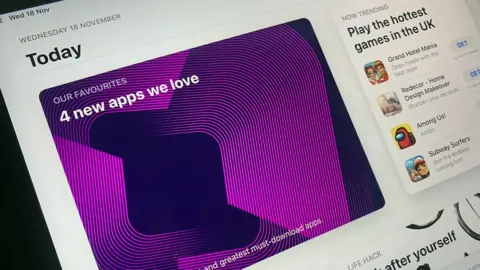Apple slashes commission fees to developers on its App Store
 Getty Images
Getty ImagesApple is halving the commission it takes from the sale of apps and virtual goods sold within them from many of the smaller developers using its stores.
From January, any existing app-maker who earned $1m (£830,000) or less from Apple's marketplaces in 2020 will only have to give up a 15% cut in 2021.
That compares to the standard rate of 30%. New developers also qualify.
It follows widespread criticism by developers of the fees Apple charges, and coincides with anti-trust scrutiny.
Chief executive Tim Cook was questioned several times about the rates his firm charges when he appeared before US lawmakers at a competition hearing in July. It emerged there that Amazon had negotiated a special 15% rate for in-app charges within its Prime Video app.
And the preceding month the European Commission opened its own probe into the marketplace's rules.
Apple, however, has characterised the move as being a natural evolution of its policies, which it had made after listening to feedback from its developer communities.
About 28 million developers use Apple's store, and the firm says the vast majority of those who charge fees will benefit.
But it has not provided a figure for how many it forecasts will be affected.
One of those who will earn more told the BBC he welcomed the move, but said that might not be true of everyone.
"Earlier in the year, Apple faced a lot of bad PR because it was seen to be capitalising on the pandemic by charging its 30% cut on small businesses - like those offering fitness training or classes - that had gone virtual via an app," said Benjamin Mayo, creator of the Daily Dictionary and Bingo Machine apps.
"So they and others of us in the indie community will see this as a good thing.
"But the bigger apps like Spotify and Epic will likely see this as unfair as they're being excluded despite earning the App Store more money."
Video game Fortnite's developer Epic later confirmed this point.
"This would be something to celebrate were it not a calculated move by Apple to divide app creators and preserve their monopoly on stores and payments, again breaking the promise of treating all developers equally," said the firm's chief executive Tim Sweeney.
Sole store
By design, the scheme will exclude the highest-earning software creators for Apple products.
At present, the only way for developers to offer native apps - rather than those that run via a web browser - for iPhones, iPads, Apple Watches and the Apple TV set-top box is via the firm's App Store.
By contrast, they can sell their products directly to consumers or via alternative marketplaces on its Mac computers.

Under the new scheme, the 15% rate applies if their total earnings from apps sold via Apple fell below the $1m threshold the previous year.
But it rises to 30% again for any additional sales made beyond $1m during 2021.
The $1m figure is calculated on the basis of the developers' post-commission earnings rather than the total revenue of their products.
And Apple intends to continue the initiative in later years.
Cut-off point
One quirk of the scheme is that it gives developers an incentive to pull products or make them free towards the end of the year to avoid crossing the cut-off point.
This is because if a software-maker earns $1,000,001 they would face the full 30% rate the following year, but if they made $999,999 they would qualify for the discount.
An alternative would have been to simply let all developers benefit from the lower rate on the first $1m of their earnings.
But the tech giant has indicated it wanted to limit the scheme to its smaller, independent developer community and believed this was the best way to do that.
Market research firm Sensor Tower told the BBC its data suggests about 4.9% of the App Store's total revenue in 2019 came via those earning less than $1m.
"Other platform holders who have yet to budge on their own 30% cut will be taking note and may now feel the need to act," said Craig Chapple, a strategist at the firm.


This is a clever move by Apple to try to show both developers and regulators that it is responding to concerns that it abuses its dominant position in the iOS app market.
But there is less to this change than meets the eye.
Sure, the cut in commission will probably benefit the vast majority of its 28 million developers.
But as Apple won't be transparent about how many of them release paid apps but earn less than $1m a year from them, we can't put a number on how many will be affected.
Similarly, the company won't tell us what proportion of its App Store revenue comes from developers earning more than $1m who will continue to pay a 30% commission.
What we do know is that services now make a very important contribution to Apple's bottom line and it's thought it earned $50bn from the App Store in 2019.
You can bet that this move is not going to affect that flow of cash in any material fashion.
Cynics will say this is a divide-and-rule strategy to quieten the complaints from smaller developers.
But don't expect the giants - or indeed the EU regulators - to turn down the volume.
